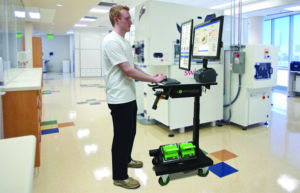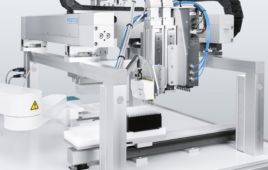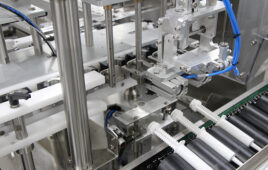A manufacturer that eliminates paper from its shop floor can save time and money while reducing errors.
John O’Kelly, Newcastle Systems

(Image from Newcastle Systems)
As competition and regulation in medical device manufacturing increase, speed and accuracy take on even more importance. Paperless operations streamline the approach by reducing errors and speeding up delivery.
Benefits of going paperless
- Reduced motion — Walking back and forth endlessly from product to printer impedes efficiency in the manufacturing process. In many cases, the wasted steps occur when associates on the floor walk to a static printer or computer, since most do not have direct access to vital information needed to accurately complete their job. The shift to paperless processing reduces motion and cuts down on steps, vastly improving productivity. Companies that have already embraced a paperless shop floor have seen a 75% reduction in overtime, a 90% reduction in labeling errors and a savings of up to $7,500 in labor costs per user.
- Improved accuracy and tracking — Errors are common when associates need to look at multiple pieces of paper to track and complete their tasks. Changes are quite common in medical device manufacturing, and paperless techniques make it easy to update important data accurately.
- Real-time data — The ability to continuously monitor real-time data enables workers to view, analyze and make decisions using the most accurate statistics possible, thus improving decision-making across the company. When paper is the primary information source on the floor, employees are often working with outdated information. Gathering data is time-consuming and takes a lot of work. Automation is key to improved efficiency.
The benefits are clear, but how do you implement a paperless methodology within your manufacturing facility? Here are a few solutions to consider.
How to go paperless
Because of medical device manufacturing regulation requirements, work instructions and the device history records (DHR) must follow the staff member and manufactured product at all stages of production. Introducing mobile-powered work stations, equipped with a laptop, printer and a radio frequency (RF) scanner, gives staff the flexibility to move with and/or around the product. This reduces wasted motion and the need for a paper trail, which can be costly when it comes to efficiency and accuracy.
When combined with a mobile-powered workstation, enterprise resource planning (ERP) and manufacturing execution system (MES) software help reduce the use of paper and the risk of errors while also decreasing part lead time.
Medical and clinical device manufacturer Cogmedix recently embarked upon a company-wide process improvement initiative that included the shift to paperless processing. Derek Fournier, scaled product launch manager at the company, said under Cogmedix’s previous ERP system, technicians were walking to static computer stations to log in and out of work orders.
“The disruptions would escalate at lunchtime and end-of-day as lines would tend to form with multiple associates looking to transact their work orders,” Fournier said. “Also, for associates who were running higher-volume production with multiple work orders in a day, that required them to remove themselves from the production cell every time a work order was completed and started.”
Add RF scanning
Combined with ERP software, RF scanning enables staff members to reduce their paper trail and complete their tasks in a timely manner. RF scanning allows staff to book production output directly, giving all staff members an easy way to track everything that leaves the floor — a huge efficiency benefit when tracking output stats and projects’ status. Implementing RF scanning also reduces the time needed to complete inventory checks and gives everyone on the floor a clear understanding of inventory. Paperwork with tasks and lists cut into productivity, while RF scanning gives correct picking assignments faster, adding a layer of efficiency and accuracy.
For Cogmedix, the integration of mobility and elimination of paper has dramatically improved the manufacturing process. “Now, we can maximize our resources, get cells up and running faster and be more productive using strategic computers, printers and scanners,” Fournier said.
The medical device manufacturing industry is fiercely competitive. Everyone is looking to be faster and more accurate, meaning that even the smallest improvements in efficiency, such as going paperless, can give you a leg-up on the competition. The transition doesn’t happen overnight; it takes time. However, the result is a more competent manufacturing process and an improved bottom line.
John O’Kelly is the founder and CEO of Newcastle Systems, a workplace mobility solutions company partnering with many of the world’s leading companies to enhance worker productivity, operational efficiency and organizational profitability.
The opinions expressed in this blog post are the author’s only and do not necessarily reflect those of Medical Design and Outsourcing or its employees.




